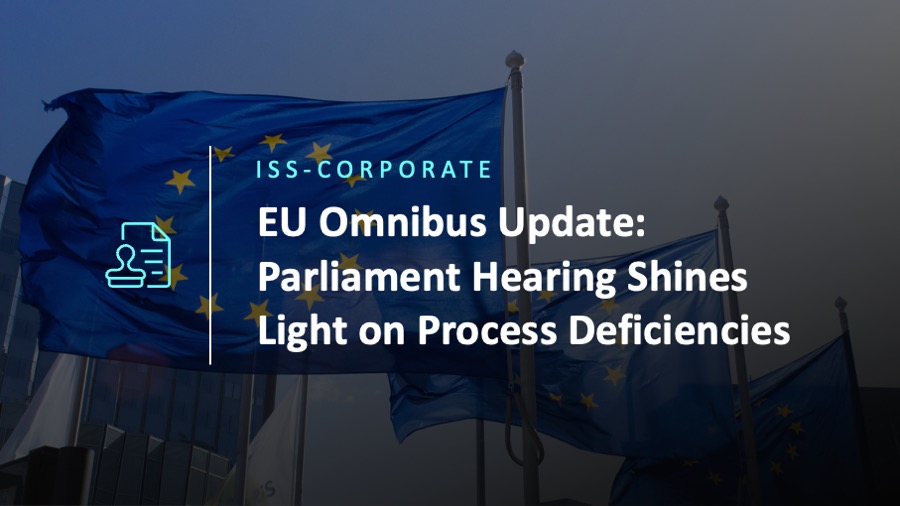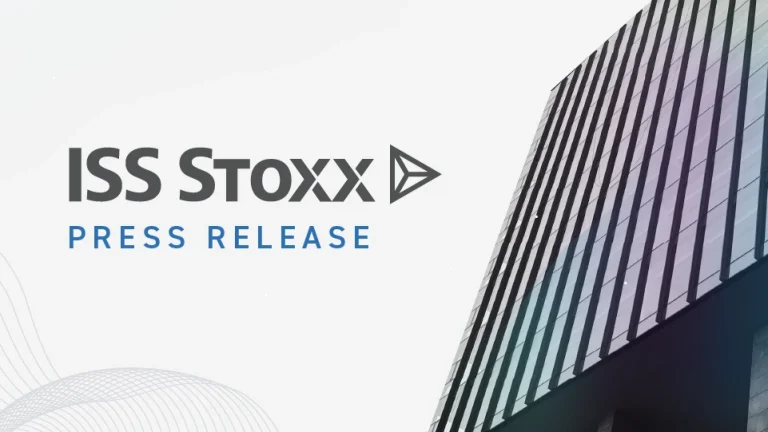Below is an excerpt from ISS-Corporate’s recently released article “EU Omnibus Update: Parliament Hearing Shines Light on Process Deficiencies”. The full article is available on the ISS-Corporate online library.
On May 13, the Committee on Legal Affairs (JURI) of the European Parliament convened a public hearing on reporting obligations to gather stakeholder perspectives on the changes to the Corporate Sustainability Reporting Directive (CSRD), the Corporate Sustainability Due Diligence Directive (CSDDD) and the Taxonomy Regulation proposed by the European Commission under the first Simplification Omnibus Package.
The central debate concerned whether the Commission’s proposals for a significant reduction in the scope of mandatory reporting and substantial content changes would achieve the targeted reduction in administrative burdens for businesses without compromising the regulations’ core objectives.
Swedish MP Jörgen Warborn (centre-right European People’s Party Group, EPP), the Parliament’s lead rapporteur on reporting obligations, reiterated his support for addressing concerns over over-regulations and for focusing on empowering rather than overwhelming businesses. Representatives from business advocacy groups Business Europe and SMEunited called for radical simplification, exceeding the changes proposed by the Commission.
Representatives of assurance providers (Accountancy Europe) and software and consulting firms shared practice-focused insights, emphasizing the availability and value of first CSRD reports as a basis for informed decisions on modifications. Importantly, best practices can illustrate the adoption of a risk-based approach and a focus on proportionality in line with the principles of the current regulations.
Key Regulatory Changes to the EU Omnibus Package
The European Commission intends to adopt a “quick-fix” delegated act addressing the uncertainties faced by Wave 1 companies not covered in the first Omnibus. This change would remove the requirement for additional sustainability information (e.g., anticipated financial effects under E1-9, E2-6, E3-5, E4-6 and E5-6; characteristics of non-employee workers under S1-7) to be disclosed for FYs 2025 and 2026 under the current CSRD phase-in approach.
The Commission also plans to release recommendations on the use of the Voluntary Reporting Standard for SMEs (VSME Standard) before the end of Q2.
EFRAG, the Commission’s technical advisor with the mandate to develop a simplified ESRS, plans to open the exposure draft for a for public consultation in late July. Simplification of ESRS (Set 1) will focus on the following:
- Simplification of the Double Materiality process and documentation requirements.
- Review of GHG emissions reporting boundaries.
- Reduction of horizontal documentation requirements.
- Improve readability and usability, including further alignment with the IFRS Sustainability Disclosure Standards.
- Substantial reduction in the number of mandatory datapoints, maintaining only relevant and decision-useful elements.
- Application of a principles-based approach to Policies, Actions, Targets (PAT) disclosures.
By:
Reinhilde Weidacher, Managing Director, Head of Corporate Sustainability Services, ISS-Corporate



